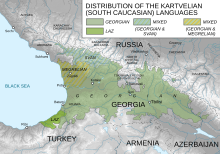 Distribution of the Svan language in relation to other Kartvelian (South Caucasian) languages. | |
| Total population | |
|---|---|
| c. 14,000[1]–30,000[2] | |
| Regions with significant populations | |
| 14,000[1]–30,000[2] | |
| 45 (2010)[3] | |
| Languages | |
| Svan, Georgian | |
| Religion | |
| Predominantly † Eastern Orthodox Christianity (Georgian Orthodox Church) | |
| Part of a series on |
| Georgians ქართველები |
|---|
 |
| Nation |
| Georgia |
| Ancient Kartvelian people |
| Subgroups |
| Culture |
| Languages |
| Religion |
| Symbols |
| History of Georgia |
The Svans (Georgian: [სვანი, Svani] Error: ((Lang)): text has italic markup (help)) are an ethnic subgroup of the Georgians (Kartvelians)[4][5][6][7][8][9][10] living mostly in Svaneti, a region in northwest Georgia. They speak the Svan language and are mostly bilingual also in Georgian. Both these languages belong to the Kartvelian (South Caucasian) language family. In the pre-1930 Soviet census, the Svans were afforded their own "ethnic group" (natsional'nost) category.[11] The self-designation of the Svan is Mushüan, which is probably reflected in the ethnonym Misimian of the Classical authors.[12]


